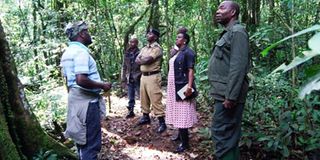Resources: Unending battles between wildlife and humans

UWA’s Edward Asalu (in green uniform) guides tourists around a forest in Kibale National Park. Below is PHOTOs BY Ruth Katusabe.
What you need to know:
Whereas tourism is one of the leading foreign exchange earners in Uganda, the industry still faces a number of challenges resulting from human activities.
Uganda is a country gifted with high levels of organism at various categories such as animals, plants, climate and cultural diversity. It also houses more than 10 national parks with a variety of habitats, which include at least 1,000 bird species, the rare mountain gorilla and other mammals. This is not only important for promoting the country to the rest of the world but also a source of foreign exchange.
In 2013, tourism alone fetched 7.9 per cent (about Shs5.5 trillion) of the country’s GDP. However, the sector is now facing a challenge of high wildlife crime rates, most of which are related to poaching and encroachment on the national parks reserves and protected areas.
On March 13, a fresh row erupted between Uganda Wildlife Authority (UWA) officials and the local residents of Mukoto Sub-county in Manafwa District, neighbouring Mt Elgon National Park. The fight between the two groups was over the boundary of gazette wildlife area.
The residents accused UWA officials of persistently destroying their food crops despite being outside the gazetted park land. This is not unique to Mt Elgon. Mt Rwenzori, home to Mt Rwenzori National Park is not spared either. What is clear is that there is continuous encroachment on wildlife gazetted land.
What is lacking?
What seems not addressed is the reason why people continue encroaching and poaching the wildlife, amidst communication and laws that prohibit such acts. Whereas government continues to prosecute people who encroach on and poach from protected areas, there seems to be lack of knowledge and intrinsic motivation among local people living around these areas over what tourism contributes to their lives.
Most resident feel they get very little from tourism, a perception that seems to undermine tourism conservation.
Eryeza Kihuuku, a resident of Nyakitokoli village near Mt Rwenzori, says when tourists come, they give them tips on agriculture, specifically growing of flowers and crops such as green pepper and vegetables. “They also teach us about, climate conservation methods such as terracing, mulching and stop us from us from cutting trees,” Kihuuku says.
To Kihuuku, these are the only benefits he gets from tourism. It may sound an offbeat, but to him the benefit is what he gets directly from tourists themselves.
However, Ivan Byaruhanga, a teacher at Nyakitokoli Primary School near Mt Rwenzori, says since tour guiding is largely provided by local people, it is a form of employment that a few local people enjoy. He also acknowledges that sometimes UWA sensitises people regarding how to conserve the area by giving them some tree seeds.
Nevertheless, Byaruhanga cheerfully says despite the little direct benefits from the sector, residents are assured of safe water (flowing from the rocks on the mountain) and cool weather, an important benefit that most people who leave near Mt Rwenzori talk about.
Are locals benefiting?
Prof John Kasenene, the vice chancellor Mountains of the Moon University and a former UWA chairman, says locals working in these national parks are directly or indirectly benefiting from these areas, especially those communities around centres which are gazzetted as parks. This, Prof Kasenene says, is through consumption of local foods, accommodation, and jobs such as tour guiding.
They also carry tourists’ luggage for some money in return.
Kasenene notes that the biggest challenge faced by wildlife is ignorance among the community that leads to misuse of our biological resources, the bio-diversity, which is potential for tourism by exploitation. “There’s no selective utilisation of these resources.
Everything is used excessively” he says. “People destroy the habitat by transforming big areas into agricultural lands at the expense of bio-diversity, planting mono-crops (mono-culture) such as maize, bananas,” he says. He continues: “Anyone can become a tourism developer, but if we need quality conservative tourism, education is very crucial. People must have the knowledge, skills and tools to engage in tourism,” he says, adding: “It is not a try and error business, never. Tourism is a science and therefore requires scientific management. It is important to know how the environment works. We are supposed to be living in nature and with nature.
Until local residents feel the importance of tourism or wildlife in particular, the row between the two parties is yet to end.
UWA SPEAKS OUT
Kula Asa Musinguzi, the UWA community conservation coordinator, says the current clashes between the community and UWA over protected areas result from not only ignorance among the community, but also population explosion. “We have a very fast growing human population”, Mr Musinguzi says. “As the population increases, the demand for more land increases hence encroaching on wildlife land”. He also says the authority is sensitising people to equip them with knowledge about the benefits of wildlife conservation.
Musinguzi adds that UWA came up with collaborative projects to attract people to conserve wildlife protected area. These involve engaging communities and giving them rewards for good actions. UWA also gives bursaries to people who live near protected areas. He stresses that the moment the population realise the economic value of wildlife, they will not encroach on its territory.




